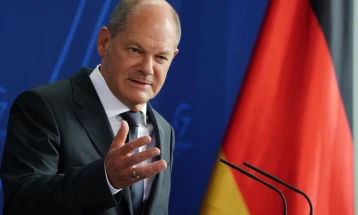Survey: Most Germans in favour of spending more on European security
- Following the US presidential election and the collapse of Germany's coalition, a survey released on Tuesday showed 73% of Germans believe Germany should invest more in European security. But the survey, commissioned by the Körber Foundation, showed that 58% do not want Germany to take a leadership role, should the United States withdraw internationally.

Berlin, 12 November 2024 (dpa/MIA) - Following the US presidential election and the collapse of Germany's coalition, a survey released on Tuesday showed 73% of Germans believe Germany should invest more in European security.
But the survey, commissioned by the Körber Foundation, showed that 58% do not want Germany to take a leadership role, should the United States withdraw internationally.
When asked which part had the greater foreign policy competence, participants gave 28% to the opposition conservative chancellor candidate and Christian Democratic Union (CDU) leader Friedrich Merz. Economy Minister Robert Habeck from the Green party received 18% while the Social Democratic Chancellor Olaf Scholz polled 15%.
The annual representative survey "The Berlin Pulse" was conducted by the polling institute Verian in September and supplemented with an additional survey on November 7 and 8, following the US presidential election and the coalition breakdown.
Even in the September survey, Defence Minister Boris Pistorius' (SPD) proposal to increase defence spending to 3% to 3.5% of the gross domestic product received 50% approval, while 15% said that was too low.
At the same time, a majority (65%) are against a military leadership role for Germany in Europe. Last year that figure was 71%. When it comes to greater involvement in international crises overall, Germans are divided: 46% were in favour in September - the highest figure since the survey began in 2017 - while 44% still oppose it.
Transatlantic relations under fire
The vast majority expect the election of Donald Trump to his second presidency would negatively impact relations with the US, with 79% holding that view.
As of September, 74% of Germans and 84% of those surveyed in the US rated relations as good or very good.
The poll showed that 88% want Germany to prioritize its relationships with European partners, while 71% said the country should expand ties in Asia, Africa, and Latin America.
For 46%, the US remains Germany's most important partner.
The three greatest foreign policy challenges, according to the poll in September, were Ukraine at 45% - which is the highest figure since Russia invaded in 2022, followed by 31% for migration and 17% for the Middle East.
Declining solidarity with Ukraine
Two and a half years after the onset of the Russian invasion of Ukraine, 57% of those surveyed still support military aid to the embattled country.
However, this figure has decreased compared to the previous year's 66%. Support is particularly low in East Germany, where only 40% favour ongoing military support.
Some 47% of respondents believe Ukraine should defend itself until all Russian-occupied territories are reclaimed, while 43% think Ukraine should concede parts of its territory to Russia to try to end the war.
More Germans view Russia as a military threat
A majority of Germans - 82% - perceive Russia as a military threat to Germany, an increase of six points compared to the previous year.
Half of Germans (52%) believe that the deployment of US intermediate-range missiles in Germany increases the risk of war with Russia.
Iran is seen as a military threat by 60% of respondents, and China by 57%.
Clear rejection of military aid for Israel
A significant majority of 79% are against military support for Israel in the war against the Palestinian Islamist Hamas militia.
At the same time, 64% think Germany should act as a mediator between Israel and Hamas and 87% support Germany's humanitarian aid for people in the Gaza Strip.
Continued mistrust towards China
The growing influence of China is viewed negatively by 61% of respondents.
More than half of Germans (56%) also see China as a major threat to the domestic economy. An additional 34% feel at least a slight threat.
Six out of 10 Germans (60%) advocate for greater economic independence from China, even if it results in economic and job losses in Germany.







